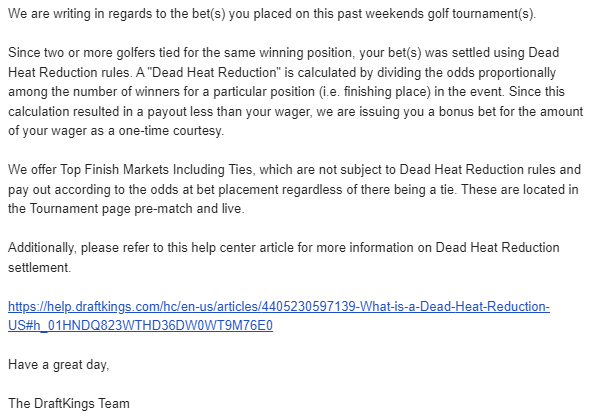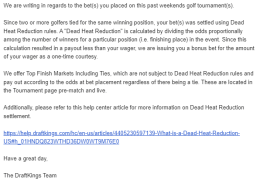
Sep 12, 2015; Dallas, TX, USA; A general view of the DraftKings sign board during the match with FC Dallas playing against New York City FC at Toyota Stadium. Mandatory Credit: Matthew Emmons-USA TODAY Sports
- The Massachusetts Gaming Commission agreed to allow the investigations enforcement bureau to investigate DraftKings for recent erroneous emails
- According to IEB counsel, DraftKings sent out erroneous emails to more than 1.2 million Massachusetts residents, 184 of which were on a voluntary exclusion list
- The investigation will lead to an adjudicatory hearing before the commission
Erroneous emails sent by DraftKings to more than 1.2 million Massachusetts residents, including nearly 200 on a voluntary exclusion list, will require an adjudicatory hearing before the Massachusetts Gaming Commission for the sports betting company.
This past August, DraftKings erroneously sent emails to users throughout the U.S. alerting them they would be receiving a “bonus bet” for placing a wager on a golf tournament. However, the vast majority of these emails were accidentally sent out to a large section of DraftKings users, or those who weren’t even registered with the operator, who never placed bets on the tournament.
Unfortunately for the operator, 184 Massachusetts residents who placed themselves on a voluntary exclusion list to not receive communications from sports betting operators received the email.
More Investigation Needed
The Massachusetts Gaming Commission unanimously agreed to send the matter to the investigations enforcement bureau (IEB) for further investigation. DraftKings will eventually face an adjudicatory hearing with the IEB serving as a party in the meeting.
According to Zachary Mercer, general counsel for the IEB, DraftKings sent out 1,230,520 emails to Massachusetts residents, including the 184 individuals who placed themselves on the state’s voluntary exclusion list. If the emails are eventually classified as advertising, marketing, or branding, they would be in violation of state gaming regulations, he said.
Not all of the residents who received an email were registered DraftKings users, Mercer said, which led him to believe that they were accidentally sent out to individuals who were on company marketing lists.
“It was essentially an entire database worth of email addresses,” he said.
Commissioner Nakisha Skinner directed Mercer and the IEB to further investigate if any of the individuals who received an email were under the age of 21.
DraftKings sent the emails last month. The messages explained to users that a “dead heat reduction” was used to determine the outcome of a golf tournament where two or more golfers tied for the same winning position. The notification told users that they would be receiving a “bonus bet” for the amount of their original wager as a one-time courtesy.
“We are writing in regards to the bet(s) you placed on this past weekends golf tournament(s),” the email began.
Many DraftKings users who received the message never placed a bet on the tournament, prompting them to believe their accounts were hacked or compromised.

DraftKings notified users of the error, simply claiming the emails were mistakenly sent out to more than originally intended.
MGC Prohibits Chinese Soccer League
The MGA unanimously agreed to prohibit sports betting on matches governed by the Chinese Football Association, which is currently under investigation for match fixing allegations.
The association recently banned 43 individuals for life after it was found that 12 matches in domestic leagues were implicated in the investigation. Overall, 128 criminal suspects and 41 clubs in the CFA were involved in the allegations.
The MGC voted to suspend betting on any CFA matches in the state.
Rob covers all regulatory developments in online gambling. He specializes in US sports betting news along with casino regulation news as one of the most trusted sources in the country.
Massachusetts regulators have recently criticized DraftKings, a popular fantasy sports company, for sending inaccurate emails to its customers. The emails in question contained misleading information about the availability of certain contests and promotions, leading to confusion and frustration among users.
The Massachusetts Gaming Commission (MGC) issued a statement expressing their concern over DraftKings’ failure to provide accurate and transparent information to its customers. The MGC emphasized the importance of companies in the gaming industry maintaining a high level of integrity and honesty in their communications with consumers.
DraftKings has since apologized for the error and has taken steps to rectify the situation by sending out corrected emails to affected customers. The company has also implemented new protocols to ensure that future communications are accurate and reliable.
This incident serves as a reminder of the importance of companies being diligent in their communications with customers, especially in industries like gaming where trust and transparency are crucial. It also highlights the role that regulators play in holding companies accountable for their actions and ensuring that consumers are protected.
Moving forward, it is essential for companies like DraftKings to prioritize accuracy and clarity in their communications with customers to maintain trust and credibility in the marketplace. By learning from this mistake and implementing stricter protocols, DraftKings can work towards rebuilding trust with its customers and regulators alike.

